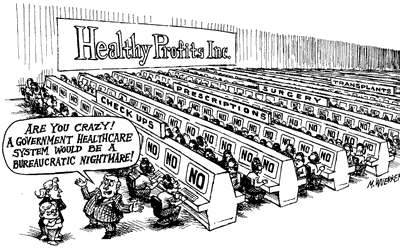'Medicare for All' Must Remain the Goal
Go ahead and wade through the cacophony of responses to the Supreme Court decision. It should be a fascinating excursion through society's exposed soul at its finest, and at its worst. Some of the responses you will hear will rely on refined cognitive processes and others on fundamental reflexive emotions.
Go ahead and wade through the cacophony of responses to the Supreme Court decision. It should be a fascinating excursion through society's exposed soul at its finest, and at its worst. Some of the responses you will hear will rely on refined cognitive processes and others on fundamental reflexive emotions.

You will not hear much new. The sounds will only be louder and more concentrated. Most of you will be able to sort the good policies from the bad policies and identify the special interest sources of the various proposals. Most of us know to keep foremost in our thoughts the only special interest that counts - the patient - with the full understanding that special interests which truly support patients are the ones that we want to pull out of the chaff, leaving behind those such as the private insurers who would serve others using the patient only as marketplace chattel.
We need to continue to guard against the "sound-good" proposals that would seem to move us incrementally toward a high performance system that serves all patients well. By incremental proposals we are not referring to important measures such as reinforcing the primary care infrastructure and expanding the presence of community health centers in underserved communities. Improving the effectiveness and quality of the health care delivery system is a continual process that must always be with us.
The sound-good incremental steps are those that would seem to move us in the right direction but are more like trying to walk up the steep side of a mountain in deep, loose sand. The steps seem to go forward, but the peak is never reached. Yet we will hear pleas to move up this slope. We have been climbing this slope for half of a century, and it's time to look for another route.
Many will plead to keep the glass half full now that the Act has been upheld, while others of us will complain about the glass being half empty. It is time to end this petty fray when we can have a full glass - affordable, high quality care for everyone - simply by enacting a single payer national health program. Call it an improved and expanded Medicare for all, if you will.
Yes, the Supreme Court ruled that the individual mandate survives as a tax, and that Medicaid is limited but not invalidated. But these decisions have been only a diversion, and thus are included here only as a parenthetical remark. The decisions were limited to an Act that merely tweaks the status quo, when what we need is a new act that rejects the status quo. The Supreme Court does not have the authority to bring us that act. Above all, we must guard against celebrating the fact that the Affordable Care Act was upheld, if that should mean that we would walk away from the reform that we desperately need.
An Urgent Message From Our Co-Founder
Dear Common Dreams reader, The U.S. is on a fast track to authoritarianism like nothing I've ever seen. Meanwhile, corporate news outlets are utterly capitulating to Trump, twisting their coverage to avoid drawing his ire while lining up to stuff cash in his pockets. That's why I believe that Common Dreams is doing the best and most consequential reporting that we've ever done. Our small but mighty team is a progressive reporting powerhouse, covering the news every day that the corporate media never will. Our mission has always been simple: To inform. To inspire. And to ignite change for the common good. Now here's the key piece that I want all our readers to understand: None of this would be possible without your financial support. That's not just some fundraising cliche. It's the absolute and literal truth. We don't accept corporate advertising and never will. We don't have a paywall because we don't think people should be blocked from critical news based on their ability to pay. Everything we do is funded by the donations of readers like you. Will you donate now to help power the nonprofit, independent reporting of Common Dreams? Thank you for being a vital member of our community. Together, we can keep independent journalism alive when it’s needed most. - Craig Brown, Co-founder |
Go ahead and wade through the cacophony of responses to the Supreme Court decision. It should be a fascinating excursion through society's exposed soul at its finest, and at its worst. Some of the responses you will hear will rely on refined cognitive processes and others on fundamental reflexive emotions.

You will not hear much new. The sounds will only be louder and more concentrated. Most of you will be able to sort the good policies from the bad policies and identify the special interest sources of the various proposals. Most of us know to keep foremost in our thoughts the only special interest that counts - the patient - with the full understanding that special interests which truly support patients are the ones that we want to pull out of the chaff, leaving behind those such as the private insurers who would serve others using the patient only as marketplace chattel.
We need to continue to guard against the "sound-good" proposals that would seem to move us incrementally toward a high performance system that serves all patients well. By incremental proposals we are not referring to important measures such as reinforcing the primary care infrastructure and expanding the presence of community health centers in underserved communities. Improving the effectiveness and quality of the health care delivery system is a continual process that must always be with us.
The sound-good incremental steps are those that would seem to move us in the right direction but are more like trying to walk up the steep side of a mountain in deep, loose sand. The steps seem to go forward, but the peak is never reached. Yet we will hear pleas to move up this slope. We have been climbing this slope for half of a century, and it's time to look for another route.
Many will plead to keep the glass half full now that the Act has been upheld, while others of us will complain about the glass being half empty. It is time to end this petty fray when we can have a full glass - affordable, high quality care for everyone - simply by enacting a single payer national health program. Call it an improved and expanded Medicare for all, if you will.
Yes, the Supreme Court ruled that the individual mandate survives as a tax, and that Medicaid is limited but not invalidated. But these decisions have been only a diversion, and thus are included here only as a parenthetical remark. The decisions were limited to an Act that merely tweaks the status quo, when what we need is a new act that rejects the status quo. The Supreme Court does not have the authority to bring us that act. Above all, we must guard against celebrating the fact that the Affordable Care Act was upheld, if that should mean that we would walk away from the reform that we desperately need.
Go ahead and wade through the cacophony of responses to the Supreme Court decision. It should be a fascinating excursion through society's exposed soul at its finest, and at its worst. Some of the responses you will hear will rely on refined cognitive processes and others on fundamental reflexive emotions.

You will not hear much new. The sounds will only be louder and more concentrated. Most of you will be able to sort the good policies from the bad policies and identify the special interest sources of the various proposals. Most of us know to keep foremost in our thoughts the only special interest that counts - the patient - with the full understanding that special interests which truly support patients are the ones that we want to pull out of the chaff, leaving behind those such as the private insurers who would serve others using the patient only as marketplace chattel.
We need to continue to guard against the "sound-good" proposals that would seem to move us incrementally toward a high performance system that serves all patients well. By incremental proposals we are not referring to important measures such as reinforcing the primary care infrastructure and expanding the presence of community health centers in underserved communities. Improving the effectiveness and quality of the health care delivery system is a continual process that must always be with us.
The sound-good incremental steps are those that would seem to move us in the right direction but are more like trying to walk up the steep side of a mountain in deep, loose sand. The steps seem to go forward, but the peak is never reached. Yet we will hear pleas to move up this slope. We have been climbing this slope for half of a century, and it's time to look for another route.
Many will plead to keep the glass half full now that the Act has been upheld, while others of us will complain about the glass being half empty. It is time to end this petty fray when we can have a full glass - affordable, high quality care for everyone - simply by enacting a single payer national health program. Call it an improved and expanded Medicare for all, if you will.
Yes, the Supreme Court ruled that the individual mandate survives as a tax, and that Medicaid is limited but not invalidated. But these decisions have been only a diversion, and thus are included here only as a parenthetical remark. The decisions were limited to an Act that merely tweaks the status quo, when what we need is a new act that rejects the status quo. The Supreme Court does not have the authority to bring us that act. Above all, we must guard against celebrating the fact that the Affordable Care Act was upheld, if that should mean that we would walk away from the reform that we desperately need.

